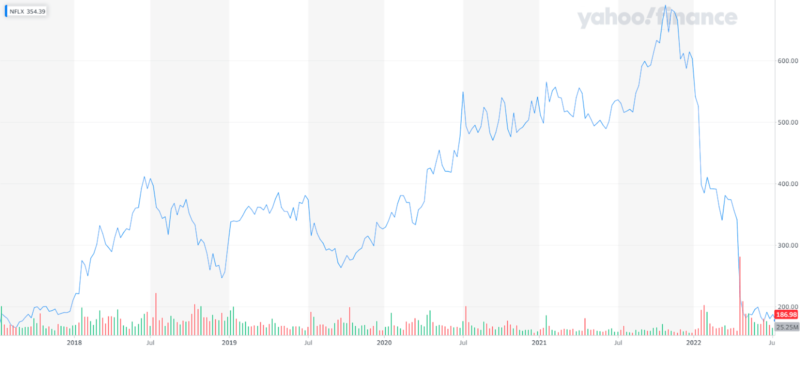The Netflix brand image crisis explained
Netflix has not had a good 2022 thus far. After two gigantic drops in share value — in January and April — the streaming giant is back where it was in the fall of 2017. This is a huge setback for a company that had just celebrated its highest earnings in history. In less than a year, its stock fell by almost 75%.
What happened? Well, as with most things, the answer is surprisingly complex. From questionable content choices, to truly bewildering business decisions, Netflix has consistently made things difficult for itself. In this article, we’ll take a look at what’s biting at Netflix — and its upcoming market prospects.

Netflix stock took a major nosedive this year. (Credit: Yahoo! Finance)
Why did Netflix stock drop so much?
There’s several reasons for the massive drop in Netflix stock value. First of all, Netflix is losing subscribers, and it’s losing them fast and quickly. The company failed to achieve the predicted subscription level at the end of 2021. It also failed doing so in the first quarter of 2022, which shareholders took to heart. To make matters worse, Netflix is preparing to lose another two million in the coming year.
The obvious reason is the loosening of the people’s approach to the ongoing COVID-2019 pandemic. The laws are becoming less strict. We choose to meet with friends, go out for a walk or clubbing, the interest in streaming is simply diminishing. To make matters worse, Netflix seems to be adding fuel to the fire by systematically increasing the prices of its subscriptions.
Netflix’s prices are going up again. In the US, the subscription price for the standard plan went up $1.50 to $15.49. The basic plan went up $1 to $9.99 and the premium plan went up $2 to $19.99. https://t.co/fCnloMLDnv
— CNN (@CNN) January 14, 2022
Netflix is also facing heavy competition. HBO Go and Disney+ are the biggest threats to the platform, but there’s also Hulu, Amazon Prime, Paramount+, Peacock… The list goes on.
A recent Deloitte study found that the average US citizen has 4 streaming subscriptions, but 20% of them are now considering opting out of at least one of them. What’s more, according to Antenna’s research, as many as 30 million US citizens unsubscribed from streaming services in the first quarter of 2022. This is 12% more than in each of the previous quarters since 2019, when Antenna started collecting data.
We’re tired and overwhelmed by the amount of subscriptions to choose from. A lot of people are simply taking the path of least resistance and of most convenience — and choosing to go back to piracy. After all, why would you sign up and pay for half a dozen services, when your local BitTorrent tracker has everything in one place?
Spending money to make money
Variety recently revealed that Netflix’s main strategy is to spend another 17 billion US dollars on the production and promotion of new titles — in 2022 alone! The company’s management has decided to use an aggressive content strategy for the coming years. There is no guarantee, however, that this strategy will bear fruit. Considering the losses both in subscribers and capital, the potential risk is great. Let’s not forget that in April, Netflix lost over $ 54 billion overnight: that’s over 60% of its market value.
The reduction in the company’s budget had consequences for its labour force. In May and June alone, mainly in North America, Netflix laid off around 450 people (around 5% of all its employees). As part of the reductions, among others, the animation department suffered losses. In the near future, we will probably see less of this type of content from the company. Budget for movies and series remains rather unchanged, with investments in millions already being finalised.
In a way, Netflix was trying to compete with Hollywood in recent years, which didn’t end too well. Currently its content budget for the next two years is fixed in place. It is even possible that ‘Knives Out 2’ will have a cinematic premiere. The era of big spending may, however, end soon for the company.
Netflix: worse, but cheaper
"to bring in new costumers" no one's paying 10 dollars to get 480p quality and ads every 2 seconds please 😭😭 https://t.co/gco6uzFasx
— iki in strictland (@Y0HW4) June 23, 2022
In June, Netflix co-CEO Ted Sarandos revealed the company’s plan to attract new customers. It includes adding a cheaper subscription option to the streaming service. The catch? Ads. For the first time in its history Netflix is moving away from its brand image of being an ad-free alternative to cinema and television.
Per Deadline, Netflix will consider a lower cost streaming tear with incorporated ads for the first time ever, within the next year or two
Netflix has lost over 200,000 Subscribers in q1 OF 2022, they are expected to lose another TWO MILLION in Q2. Not great. pic.twitter.com/HcJWe39Lxr
— TRAFON(s Backup Account) (@RiseFallNickBck) April 20, 2022
Unsurprisingly, internet users did not take the news well. In addition, the company has recently started being more bold about targeting people who share passwords. There are plans to increase the fees for these users, although for now it is not fully known how such a solution would work.
In all of this, Netflix seems to forget that piracy has always been an integral part of internet culture. We can watch the same movie or series on a TV or computer screen for absolutely free. All that is needed is a little more time looking for the appropriate links. If we can watch the same movie with or without commercials (courtesy of The PirateBay), sometimes the choice turns out to be really quite simple.
Yup. It was hilarious when Netflix started blaming "password sharing" or anything other than their terrible shotgun approach to content, rising prices, and cancelling their actually good content over why people were leaving or why they're loosing money.
— 🪶ɢᴀᴇʟ ᴠᴜʟᴛᴜʀᴇ🪶 (@Gael_Vulture) June 1, 2022
Adding fuel to the PR crisis fire
Netflix argues for free speech and against censorship when it comes to transphobia. But when it’s queer folks supporting the trans community? Suddenly they love censorship. Shocking. pic.twitter.com/6k232YvKtS
— Jaclyn Moore (@JaclynPMoore) June 17, 2022
For the past several months Netflix’s management has been plunging the company into a PR crisis. The flash point was the transphobic statements of comedian Dave Chapelle in his comedy special ‘The Closer’ from last October. Chapelle thought it was a great idea to make fun of the trans community — which, predictably, was met with heavy criticism. As it turned out, however, the aforementioned co-CEO Ted Sarandos, is standing by Chapelle and his frankly hateful views.
sure is great to know that i never have to watch or be interested in a netflix film now. instead, you morons have decided to spend your money on dave chapelle's transphobia and $41 million dollar stranger things episodes. https://t.co/iSGQjC9AI6
— coмrade_yυι (@Comrade_Yui) June 1, 2022
The reaction was predictable: a wave of criticism on social media, statements by actors such as Elliott Page, and, finally, even an employee walkout. None of it swayed chief executive Sarandos — he still insists that it is “freedom of artistic expression” and deflects by bringing up the site’s overall content being pro-LGBTQ.
This is, of course, pure symmetrism. Including LGBTQ + representations in your productions does not mean it is justified to broadcast content that directly harms these same people. Netflix’s management approach to these issues is simply pinkwashing — instrumental manipulation of LGBTQ + communities purely for profit, with no real concern for their welfare.
I'm seeing way too much hype for str@nger th*ngs and not enough people talking about how part of it was filmed at a Lithuanian concentration camp that has now been converted to a str@nger th*ngs hotelhttps://t.co/7YS9PMlWCu
— Gunner Gunn (@RunnGunnerGunn) June 15, 2022
Amid these “greatest hits”, Netflix decided to engage in another controversy: by licensing the Stranger Things brand to the Lukiškės prison in Vilnius. The site appeared in the latest season of Stranger Things — but, more importantly, it’s also a Holocaust memorial. During World War II, political prisoners and Jewish people were kept in the prison before being shipped off to execution sites in the region. It was pointed out that filming in such a location is insensitive enough — but the decision to turn one of the cells into a Stranger Things themed “experience” is simply indefensible.
What’s next for Netflix?
Given its capital, Netflix is unlikely to disappear from our devices anytime soon. Nevertheless, significant changes are to be expected in the coming years. Time will tell if Netflix will sneak its way back into investors’ good graces thanks to its aggressive content policy, to what extent its innovations in the field of subscriptions will prove successful, and whether the company will manage to defuse the ongoing PR crisis.

The platform’s overall sentiment has barely changed compared to last year.
It’s also worth noting that despite the major loss of net worth and constant PR controversies, social listening tools (like our very own SentiOne) aren’t detecting a major hike in overall sentiment. This is because the discussion of Netflix’ various controversies is drowned out by the sheer amount of discussion of content on the platform.
However, the crises Netflix is facing are very much real. The platform faces an uphill struggle if it is to retain its position as the king of the streaming landscape.



